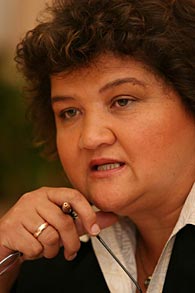Lynne Brown facts for kids
Lynne Brown (born 26 September 1961) is a South African politician. She served as a former Minister of Public Enterprises and was also a former Premier of the Western Cape Province. She was born in Cape Town and grew up in Mitchells Plain. She became Premier of the Western Cape in July 2008 after Ebrahim Rasool resigned. Before that, she was the Minister for Economic Development and Tourism. Lynne Brown is a member of the African National Congress (ANC). She was elected to the ANC's National Executive Committee in 2007 and 2012. She is from a coloured background and was the fourth coloured premier of the Western Cape.
Quick facts for kids
Lynne Brown
|
|
|---|---|

Lynne Brown in 2007
|
|
| Minister of Public Enterprises | |
| In office 25 May 2014 – 27 February 2018 |
|
| President | Jacob Zuma Cyril Ramaphosa |
| Preceded by | Malusi Gigaba |
| Succeeded by | Pravin Gordhan |
| 6th Premier of the Western Cape | |
| In office 25 July 2008 – 6 May 2009 |
|
| Preceded by | Ebrahim Rasool |
| Succeeded by | Helen Zille |
| Member of the National Assembly | |
| In office 21 May 2014 – 1 March 2018 |
|
| Personal details | |
| Born | 26 September 1961 Cape Town, Cape Province, South Africa |
| Political party | African National Congress |
Contents
Political Journey
Early Involvement
Lynne Brown started her political journey early. In 1979, she was the chairperson of the Mitchell's Plain Youth Congress. She also joined the United Women's Organisation from 1979 to 1985. Later, she was part of the United Women's Congress from 1985 to 1990. During this time, she served as an Education Officer and then as Provincial Secretary.
She was also involved with the United Democratic Front. This group was formed in 1983 and worked for change until 1991. Lynne Brown was a member of its Finance Committee.
Joining the ANC
Brown joined the African National Congress (ANC) in 1987. In 1999, she was elected to the ANC's Provincial Executive Committee. She also became part of the Provincial Working Committee. Since 1990, she has served as the Western Cape Provincial Secretary of the ANC Women's League.
Her interest in education continued beyond her teaching years. She was a board member of the National Literacy Project. She is also a board member of the Extramural Education Project. In 1990, she started and directed the Women's College.
Roles in Government
In 1994, and again in 1999, Lynne Brown was elected as an ANC Member. She served in the Western Cape Provincial Legislature. She led important committees on Community Services and on Health and Welfare. She also worked as an ANC Whip and Chief Whip in the legislature.
In 1999, she was the ANC's candidate for Mayor of Cape Town. She then served as a provincial Minister (MEC) for finance, economic development, and tourism. She held this position until she became Premier in 2008.
Premier and Opposition Leader
Lynne Brown became the Premier of the Western Cape in July 2008. However, the ANC lost control of the province in the 2009 South African general election. The Democratic Alliance won more seats in the Provincial Parliament. Helen Zille from the Democratic Alliance replaced Brown on 6 May 2009.
After this, Lynne Brown served as the Leader of the Official Opposition. She held this role from 2009 until May 2014.
Minister of Public Enterprises
In May 2014, former President Jacob Zuma appointed Lynne Brown to his cabinet. She became the Minister of Public Enterprises. In this role, she was responsible for overseeing government-owned companies.
Her time as Minister of Public Enterprises faced challenges. There were investigations into how some state-owned companies were managed. Lynne Brown was removed from the Cabinet by President Cyril Ramaphosa in February 2018. Pravin Gordhan succeeded her. She then resigned as an ANC member of parliament.
Investigations into State-Owned Companies
Findings of the Zondo Commission
The State Capture Commission, also known as the Zondo Commission, investigated issues at state-owned companies. The commission found that Lynne Brown, as Minister of Public Enterprises, appointed several people to the Board of Eskom between 2014 and 2015. The commission noted that she did not always follow official checking processes. It also found that she did not fully consider recommendations from the Department of Public Enterprises.
The commission concluded that her actions led to the appointment of some people who had conflicts of interest. Many of these individuals also had connections to certain business people. Some had no prior experience as directors of state-owned companies.
In 2021, Lynne Brown stated to the Zondo Commission that she did not know one of the business people involved. She said she was following procedures from her department. However, the Zondo Commission found evidence that suggested otherwise. It identified phone calls and emails between Brown and the business person. The commission concluded that the evidence showed Brown was familiar with the individual. It also found that she had not followed the department's processes as she claimed. The commission found that her actions helped in the improper influence over Eskom.
Parliamentary Inquiry
A parliamentary inquiry also looked into the management of state-owned companies. This inquiry found that Lynne Brown and her predecessor, Malusi Gigaba, had been "grossly negligent" in their duties. This means they were found to have been very careless in carrying out their responsibilities.
Images for kids
See also
 In Spanish: Lynne Brown para niños
In Spanish: Lynne Brown para niños
 | Jessica Watkins |
 | Robert Henry Lawrence Jr. |
 | Mae Jemison |
 | Sian Proctor |
 | Guion Bluford |


